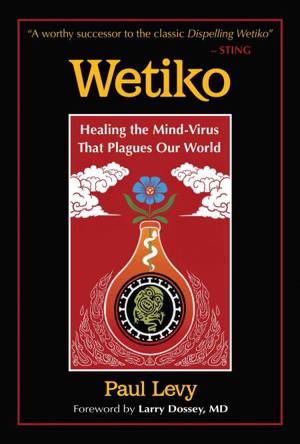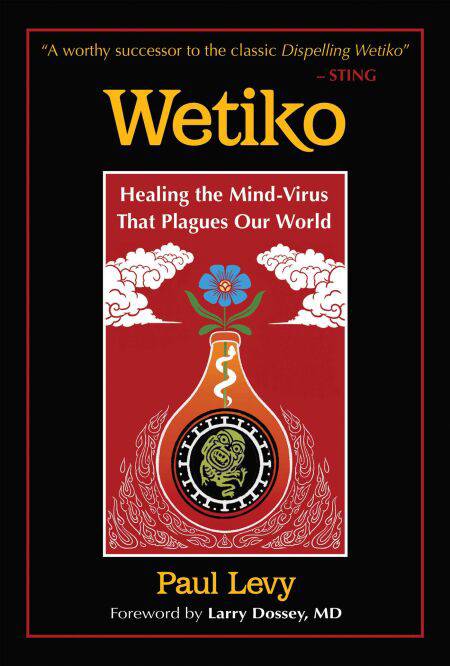
Bedankt voor het vertrouwen het afgelopen jaar! Om jou te bedanken bieden we GRATIS verzending (in België) aan op alles gedurende de hele maand januari.
- Afhalen na 1 uur in een winkel met voorraad
- In januari gratis thuislevering in België
- Ruim aanbod met 7 miljoen producten
Bedankt voor het vertrouwen het afgelopen jaar! Om jou te bedanken bieden we GRATIS verzending (in België) aan op alles gedurende de hele maand januari.
- Afhalen na 1 uur in een winkel met voorraad
- In januari gratis thuislevering in België
- Ruim aanbod met 7 miljoen producten
Zoeken
€ 15,65
+ 15 punten
Omschrijving
• Explores how wetiko covertly operates both out in the world and within our minds and how it underlies every form of self-destruction, both individual and collective
• Reveals how wetiko’s power lies in our blindness to it and examines how people across the ages have symbolized wetiko to help see it and heal it
• Examines the concept of wetiko as it appears in the teachings of the Kabbalah, Hawaiian Kahuna shamanism, mystical Christianity, and the work of C. G. Jung
In its Native American meaning, wetiko is an evil cannibalistic spirit that can take over people’s minds, leading to selfshness, insatiable greed, and consumption as an end in itself, destructively turning our intrinsic creative genius against our own humanity. Revealing the presence of wetiko in our modern world behind every form of destruction our species is carrying out, both individual and collective, Paul Levy shows how this mind-virus is so embedded in our psyches that it is almost undetectable--and it is our blindness to it that gives wetiko its power. Yet, as Levy reveals in striking detail, by recognizing this highly contagious mind parasite, by seeing wetiko, we can break free from its hold and realize the vast creative powers of the human mind.
Levy explores how artists, philosophers, and spiritual traditions across the ages have been creatively symbolizing this deadly pathogen of the psyche so as to help us see it and heal it. He examines the concept of wetiko as it appears in the teachings of the Kabbalah, Hawaiian kahuna shamanism, Buddhism, and mystical Christianity and through esoteric concepts like egregores, demons, counterfeiting spirits, and psychic vampires. He reveals how visionary thinkers such as C. G. Jung, Sri Aurobindo, Philip K. Dick, Colin Wilson, Nicolas Berdyaev, and Rene Girard each point to wetiko in their own unique and creative way. He explores how the projection of the shadow self--scapegoating --is the underlying psychological mechanism fueling wetiko and examines wetiko in the context of the Covid-19 pandemic, showing that we can reframe the pandemic so as to receive the lessons and opportunities embedded in it.
Revealing how the power of imagination can cure the wetiko mind-virus, Levy underscores how important it is for each of us to bring forth the creative spirit within us, which helps shed the light of consciousness on wetiko, taking away its power over us while simultaneously empowering ourselves.
• Reveals how wetiko’s power lies in our blindness to it and examines how people across the ages have symbolized wetiko to help see it and heal it
• Examines the concept of wetiko as it appears in the teachings of the Kabbalah, Hawaiian Kahuna shamanism, mystical Christianity, and the work of C. G. Jung
In its Native American meaning, wetiko is an evil cannibalistic spirit that can take over people’s minds, leading to selfshness, insatiable greed, and consumption as an end in itself, destructively turning our intrinsic creative genius against our own humanity. Revealing the presence of wetiko in our modern world behind every form of destruction our species is carrying out, both individual and collective, Paul Levy shows how this mind-virus is so embedded in our psyches that it is almost undetectable--and it is our blindness to it that gives wetiko its power. Yet, as Levy reveals in striking detail, by recognizing this highly contagious mind parasite, by seeing wetiko, we can break free from its hold and realize the vast creative powers of the human mind.
Levy explores how artists, philosophers, and spiritual traditions across the ages have been creatively symbolizing this deadly pathogen of the psyche so as to help us see it and heal it. He examines the concept of wetiko as it appears in the teachings of the Kabbalah, Hawaiian kahuna shamanism, Buddhism, and mystical Christianity and through esoteric concepts like egregores, demons, counterfeiting spirits, and psychic vampires. He reveals how visionary thinkers such as C. G. Jung, Sri Aurobindo, Philip K. Dick, Colin Wilson, Nicolas Berdyaev, and Rene Girard each point to wetiko in their own unique and creative way. He explores how the projection of the shadow self--scapegoating --is the underlying psychological mechanism fueling wetiko and examines wetiko in the context of the Covid-19 pandemic, showing that we can reframe the pandemic so as to receive the lessons and opportunities embedded in it.
Revealing how the power of imagination can cure the wetiko mind-virus, Levy underscores how important it is for each of us to bring forth the creative spirit within us, which helps shed the light of consciousness on wetiko, taking away its power over us while simultaneously empowering ourselves.
Specificaties
Betrokkenen
- Auteur(s):
- Uitgeverij:
Inhoud
- Aantal bladzijden:
- 336
- Taal:
- Engels
Eigenschappen
- Productcode (EAN):
- 9781644114117
- Verschijningsdatum:
- 22/11/2021
- Uitvoering:
- E-book
- Beveiligd met:
- Adobe DRM
- Formaat:
- ePub

Alleen bij Standaard Boekhandel
+ 15 punten op je klantenkaart van Standaard Boekhandel
Beoordelingen
We publiceren alleen reviews die voldoen aan de voorwaarden voor reviews. Bekijk onze voorwaarden voor reviews.









